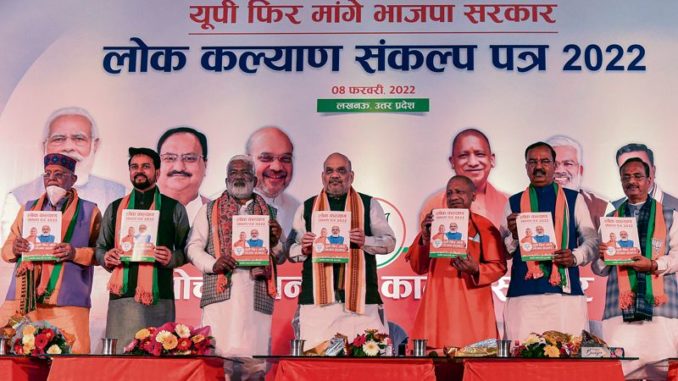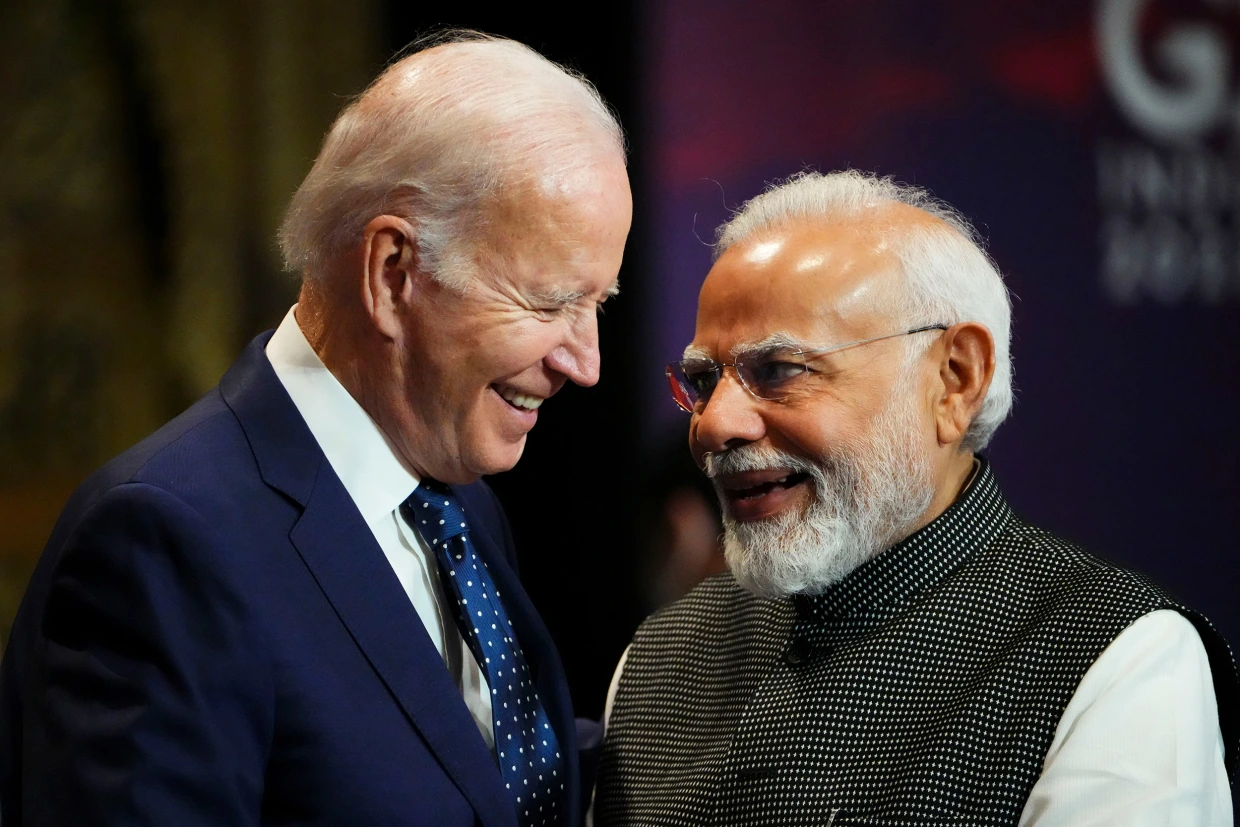
Poll manifestos in UP flaunt titles that combine purpose with hyperbole

“The BJP was caught between addressing its core Hindutva constituency and pandering to the demands and expectations of the larger electorate it had formed over the years. After a string of averments on welfare programs, its ‘sankalp patra’ bared a core commitment: enhancing the minimum punishment for ‘unlawful conversions’ from five to 10 years’ imprisonment with a Rs 1 lakh penalty. While the SP had slots for women and Dalits and the Congress for Dalits, the BJP’s manifesto had a special place for the backward castes, a cherished electorate of the party: subsidized boats for the Nishads who are engaged in fishing and overall rural development through a scheme named after ‘OBC leader Kalyan Singh’.”
Highfalutin titles never signify a sincerity of intent. In Uttar Pradesh’s election season, grandiose claims are not scarce. Short of proclaiming there’s heaven on earth, political leaders conjure every trick there is. Last week, the poll manifestos put out by three parties—the SP, BJP and Congress—flaunted titles that combined purpose with hyperbole. The SP’s document was called ‘Samajwadi Vachan Patra’ and the BJP’s ‘Lok Kalyan Sankalp Patra’. The Congress, which appears to be a peripheral player, released the ‘Unnati Vidhan’. The BSP is going without a policy statement, although its leader Mayawati now and then makes declarations in her speech.
Unmistakable in the string of promises contained in each manifesto was the shadow of the farmers’ agitation.
Unmistakable though in the string of promises contained in each manifesto was the shadow of the farmers’ agitation that rocked parts of UP and coalesced the dissent against the Centre’s laws with the state government’s failure to address the core issues of sugarcane farmers. The kisan andolan formed the backdrop of a party’s policy statements. The SP — which believes it is best placed to capitalize on the agrarian unrest with its ally, the RLD — declared that by 2025, all farmers would be debt-free, for which a debt relief law will be passed to alleviate the sufferings of small and marginal farmers. Central to the SP’s pre-electoral pitch was free electricity for irrigation (farmers complained that power consumption in fields was unmetered and the rate was ‘arbitrarily’ fixed) along with interest-free loans, an insurance cover and pension. In the light of a serious shortage of di-ammonium phosphate and urea before the sowing season in October-November 2021, the SP stated farmers owning less than two acres would also get two bags of DAP and five bags of urea. In a few places, sowing was put off because the vital inputs were not available. It was said urea supplies were diverted to plywood mills which are a major consumer and constitute a powerful economic lobby.
The BJP was on the back foot ever since the farmers’ protests snowballed into a movement that caused a law and order crisis. Unlike the demonstrations against the CAA that were quelled by the police and converted into a politically polarizing issue, the farmers were not easy pickings. Things reached a boiling point when the son of a Central minister, Ajay Mishra Teni, mowed down farmers protesting peacefully at Lakhimpur Kheri. Ashish Mishra was subsequently arrested and jailed, but released last week, leading to an outcry among the peasantry. The BJP’s manifesto was not as expansive on agriculture as the SP’s, but held out assurances of free electricity for irrigation, modernizing sugar mills, setting up new sugar cooperatives and guaranteeing settlement of payment backlog with interest within 14 days. The last is a pledge nearly every party takes before an election, but rarely redeems it.
The Congress tried to be one up on the BJP by promising to waive aside farm loans within 10 days of coming to power and purchasing the cash crops at enhanced prices. However, the Congress was also the only party to address the problem arising from the rogue cattle let loose by their owners because the Yogi regime stringently enforced a law against bovine slaughter which prohibited the sale of unproductive animals to the abattoirs. The cattle are supposed to be housed in specially made shelter homes, but these are few and far between and the animals just too many left to pillage fields. The Congress affirmed a monetary compensation for damaged land and offered to purchase dung at Rs 2 per kg as an incentive to retain sterile animals.
Among the standout points in the manifestos was the SP’s promise to create an Urban Employment Guarantee Act modelled after the Mahatma Gandhi National Rural Employment Guarantee Act to augment employment and restore the old pension system for superannuated government employees and teachers—a big constituency in UP. The BJP government persisted with the National Pension Scheme (introduced by the Centre in 2004) under which the pension’s worth depends on the corpus saved by an employee at retirement and is subject to the fluctuations in investment value. The notion of subjecting savings to market vagaries unnerved several ex-employees, although the BJP government tried to convince that the NPS was ‘more beneficial’ because the amount received could be invested in other saving schemes. Employees preferred the old pension scheme which they saw as a security net because an employee got an assured amount, regardless of how much contribution was made towards her pension during her working years. The SP’s promise had kindled interest and enthusiasm among the government employees, most of whom were committed to the BJP since 1989. The BJP was caught between addressing its core Hindutva constituency and pandering to the demands and expectations of the larger electorate it had formed over the years. After a string of averments on welfare programs, its ‘sankalp patra’ bared a core commitment: enhancing the minimum punishment for ‘unlawful conversions’ from five to 10 years’ imprisonment with a Rs 1 lakh penalty. While the SP had slots for women and Dalits and the Congress for Dalits, the BJP’s manifesto had a special place for the backward castes, a cherished electorate of the party: subsidized boats for the Nishads who are engaged in fishing and overall rural development through a scheme named after ‘OBC leader Kalyan Singh’.
Crunch time will come five years hence when the party/coalition in power will be judged on whether it was true to its word or whether the manifesto was not worth the paper it was printed on.
(The author is a Senior Journalist)





Be the first to comment